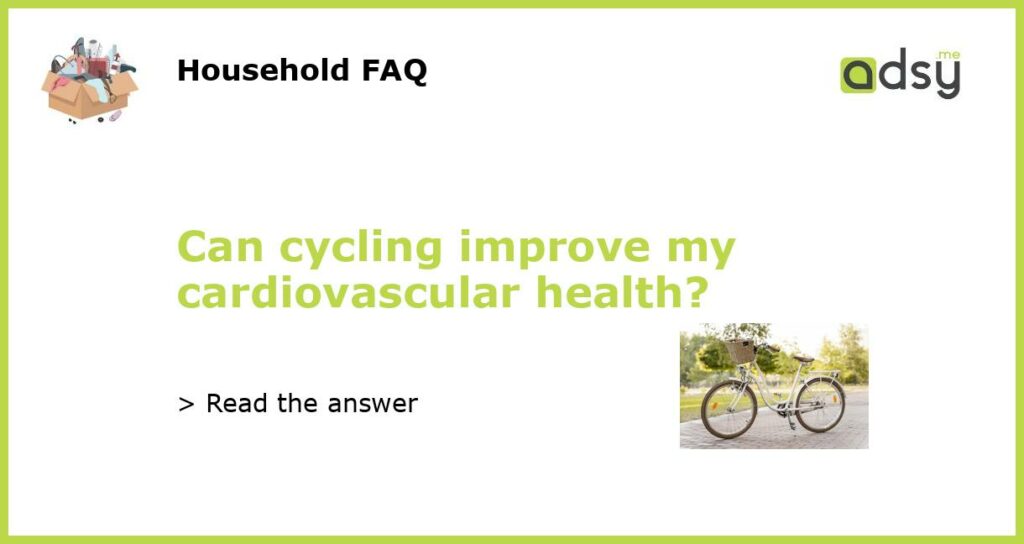Cycling: A Fun and Effective Exercise for Cardiovascular Health
Cycling is not only a popular mode of transportation; it is also a fantastic form of exercise that can greatly improve your cardiovascular health. Whether you are an avid cyclist or just getting started, incorporating regular cycling into your fitness routine can have numerous benefits for your heart and overall well-being.
The Cardiovascular Benefits of Cycling
Cycling is an aerobic exercise that gets your heart pumping and your blood flowing. Regular cycling can help decrease your risk of developing heart disease, lower blood pressure, and improve your overall cardiovascular fitness.
When you cycle, your heart rate increases, which strengthens your heart and helps it pump blood more efficiently. This increased blood flow delivers oxygen and nutrients to your muscles, organs, and tissues, improving their function and overall health.
Additionally, cycling can help lower your blood pressure. Regular aerobic exercise, such as cycling, can help reduce your systolic and diastolic blood pressure readings, making your heart’s job easier.
Cycling and Weight Management
If you are looking to maintain a healthy weight or lose a few pounds, cycling can be an excellent addition to your weight management routine. Cycling is a low-impact exercise that can burn calories and increase your metabolism.
When you cycle, you engage various muscles, including your legs, glutes, and core. This full-body workout burns calories and helps build lean muscle mass, which can increase your metabolism and help you burn more calories throughout the day.
In fact, cycling at a moderate pace for just 30 minutes can burn approximately 250 calories, depending on your weight and intensity level. By incorporating regular cycling into your routine, you can create a calorie deficit and achieve your weight management goals.
Other Benefits of Cycling
Besides improving your cardiovascular health and helping with weight management, cycling offers several other benefits for your overall well-being. Here are a few additional advantages of cycling:
- Low impact on joints: Cycling is a low-impact exercise that is gentle on your joints, making it an excellent option for those with joint pain or injuries.
- Mental health benefits: Cycling is a great way to reduce stress and improve your mental health. It promotes the release of endorphins, which can boost your mood and reduce symptoms of anxiety and depression.
- Improved lung function: Regular aerobic exercise like cycling can increase your lung capacity and improve your respiratory function.
- Enhanced balance and coordination: Cycling helps improve your balance and coordination, which can be especially beneficial for older adults.
- Environmental benefits: By choosing to cycle instead of driving a car, you can reduce your carbon footprint and contribute to a healthier planet.
Getting Started with Cycling
If you are ready to start cycling for cardiovascular health or want to incorporate it into your fitness routine, here are a few tips to get you started:
- Choose the right bike: Make sure you have a bike that fits you properly and is suitable for the type of cycling you plan to do.
- Start slow: If you are new to cycling or haven’t been active in a while, start with shorter rides at a comfortable pace. Gradually increase your distance and intensity as you build your stamina.
- Wear protective gear: Always wear a helmet and other protective gear, such as knee and elbow pads, to ensure your safety while cycling.
- Find cycling routes: Research cycling routes in your area or use apps and websites to find popular biking trails. Exploring new routes can keep your rides interesting and enjoyable.
- Join a cycling group: Consider joining a local cycling group or club. Cycling with others can provide motivation, support, and a sense of community.
Remember to consult with your healthcare provider before starting any new exercise program, especially if you have any underlying health conditions or concerns.
In conclusion, cycling is a fun and effective way to improve your cardiovascular hea






